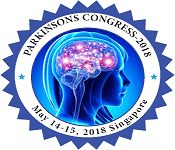
Harini Sarva
Weill Cornell Medicine, USA
Title: Deep brain stimulation in Parkinson’s disease: Review and update
Biography
Biography: Harini Sarva
Abstract
Deep brain stimulation has revolutionized Parkinson’s disease management since its inception nearly two decades ago. Various studies have reported its efficacy in treating the motor symptoms of PD with benefits lasting for years, primarily with regards to tremor, rigidity and bradykinesia. Although non-motor symptoms and gait are not well treated with subthalamic nucleus or pallidal stimulation, DBS plays a major role in improving the quality of life of individuals with advanced PD, characterized by levodopa-induced motor fluctuations and dyskinesia. In addition, there is an impetus for earlier implantation and treatment with DBS as stimulation along with medical management has been shown to be more advantageous when compared with best medical management alone. Although, the entire mechanism of action of DBS is not understood, its potential role in treating aberrant neuronal firing is an exciting concept and has fostered research into newer technologies and continuous loop stimulation. While the risk of hemorrhage and infection are low they are not negligible and likely represent cumulative data over the last 20 years. This talk will review appropriate patient selection, current studies, newer targets and upcoming technological advances in DBS for PD.

